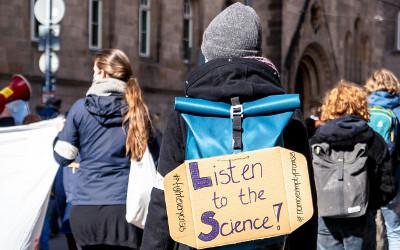Climate misinformation surveillance project secures 1 million Euro grant

A groundbreaking research initiative led by the Director of The Open University’s (OU) Knowledge Media Institute, Professor Harith Alani, has been awarded a €1 Million grant by the European CHIST-ERA programme. The grant includes £275K to the OU from the Engineering and Physical Sciences Research Council (EPSRC), to combat the growing problem of climate misinformation. The project, titled Climate Misinformation Surveillance with Multidimensional GIS, aims to integrate Geographic Information Systems (GIS) with AI, to tackle misinformation and enhance stakeholders understanding of the geopolitical spread of false claims about climate issues.
Climate misinformation has emerged as a critical challenge, with its increasing prevalence skewing public perception and derailing vital climate policy decisions. Despite concerted efforts by fact-checkers and international organisations, gaps remain in understanding how misinformation spreads geographically and its correlation with climate data. Professor Alani's team seeks to address these gaps through innovative approaches.
The core of the project is the development of a Multidimensional Geographic Information System (GIS) that will integrate diverse climate-related data — such as temperature, precipitation, wind, and carbon emissions — with misinformation data sourced from traditional media, social platforms, and fact-checking organisations. This integrated knowledge system will apply various AI methods to analyse correlations between misinformation and geographical climate trends, offering unprecedented insights into how misinformation proliferates over time and space.
"This project represents a pivotal step in understanding and addressing the intersection of climate data and misinformation," said Professor Alani. "Our aim is to create tools that not only map and analyse misinformation but also predict its spread, empowering policymakers and society to respond more effectively."
The project will use the next three United Nations Climate Change Conferences (Conference of the Parties, or COP) as case studies to refine and evaluate its methodology. By leveraging these high-profile global events, the research team plans to test the GIS-based system's ability to identify and predict the spread misinformation in real time.
Under the initiative branded as ClimateSense, the project aspires to transform how misinformation is managed in the climate sector. By offering tools to visualise the interplay of geospatial, temporal, and topical misinformation patterns, ClimateSense aims to enhance societal resilience against misinformation while informing evidence-based climate policymaking.
The grant, provided through EPSRC and CHIST-ERA, underscores the importance of this research in addressing one of the most pressing challenges of our time. As the project progresses, it promises to offer valuable insights and tools to bridge the gap between accurate climate science and public understanding. ClimateSense project will run for three years, and is a partnership between the OU, EURECOM in France, Prague University of Economics in the Czech Republic, and Kaunas University of Technologies in Lithuania.
Contact our news team
For all out of hours enquiries, please telephone +44 (0)7901 515891
Contact detailsNews & articles

OU researchers lead international advances in planetary protection
Open University researchers are leading international advances in planetary protection, helping ensure that space exploration is safe, sustainable, and scientifically rigorous.